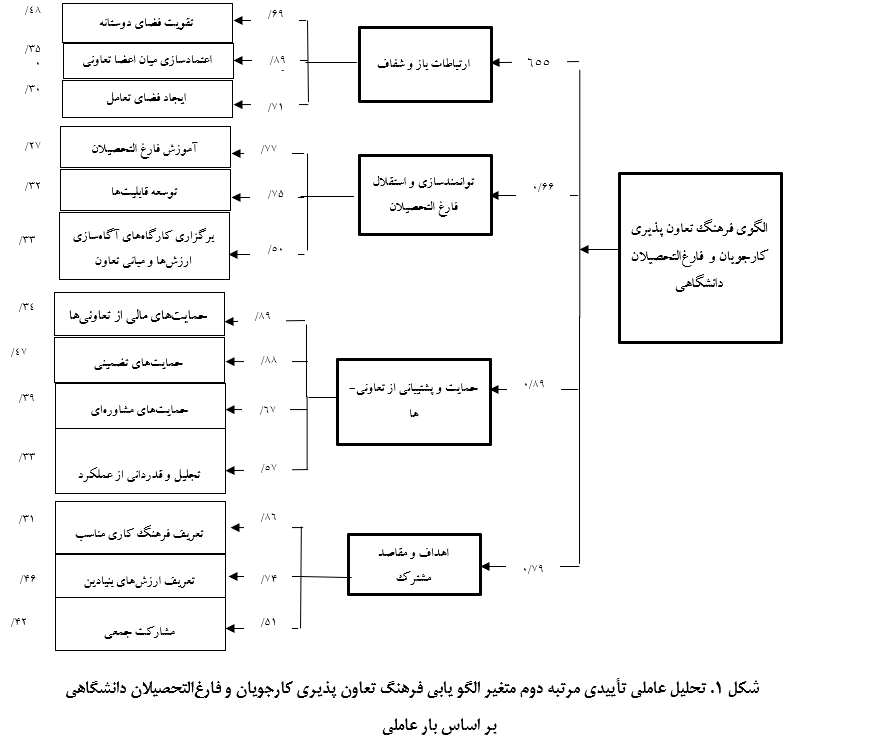اعتباریابی الگوی فرهنگ تعاون پذیری کارجویان و فارغالتحصیلان دانشگاهی
کلمات کلیدی:
فرهنگ, تعاون , پذیری , فارغالتحصیلان , کارجویانچکیده
هدف پژوهش حاضر اعتباریابی الگوی فرهنگ تعاونپذیری کارجویان و فارغالتحصیلان دانشگاهی است. پژوهش حاضر از منظر هدف، کاربردی و دارای رویکرد کمی و با روش پیمایشی انجام شده است. نمونه آماری تحقیق حاضر تعداد 276 نفر از دانشجویان رشته کارآفرینی، فارغالتحصیلان کارآفرینی، شرکتهای تعاونی دانشجویی و اساتید دانشگاه است که به صورت تصادفی انتخاب شدند. دادههای پژوهش با استفاده از پرسشنامه گردآوری و از تحلیل عاملی تائیدی برای تحلیل دادهها استفادهشده و روایی پرسشنامه از طریق روایی همگرا و واگرا و پایایی آن از طریق آلفای کرونباخ (896/0) تأیید شد. سپس سازههای مدل با استفاده از پرسشنامه بهوسیله آمار توصیفی و استنباطی و به کمک نرمافزار SPSSS و LISREL از طریق مدل یابی معادلات ساختاری بررسی و سازه مدل طبق تجزیهوتحلیلهای بهعملآمده تأیید شد. بر اساس یافتههای تحقیق، بر اساس یافتههای تحقیق، شاخصهای GFI و AGFI برای بعد ارتباطات باز و شفاف برابر با 91/0 و 90/0 و شاخص RMSEA برابر با 048/0 بودند. برای بعد توانمندسازی و استقلال فارغالتحصیلان، شاخصهای GFI و AGFI به ترتیب برابر با 91/0 و 90/0 و RMSEA برابر با 047/0 بودند. برای بعد حمایت و پشتیبانی از تعاونیها، شاخصهای GFI و AGFI برابر با 91/0 و 90/0 و RMSEA برابر با 049/0 و برای بعد اهداف و مقاصد مشترک، شاخصهای GFI و AGFI برابر با 91/0 و 90/0 و RMSEA برابر با 049/0 بودند. بنابراین، نتایج نشان دادند که ابعاد مدل با دادهها تطابق مطلوبی دارند. این یافتهها تأکید میکنند که مدل فرهنگ تعاونپذیری بهخوبی با دادههای واقعی تطابق دارد و این مضامین کلیدی میتوانند بهعنوان عواملی مؤثر در توسعه و تقویت تعاونیها و افزایش همکاریهای گروهی میان فارغالتحصیلان دانشگاهی و کارجویان مورد توجه قرار گیرند.
دانلودها
مراجع
Liu Y. Current Status of Career Maturity of Clinical Medicine Students and Its Correlation With Professional Commitment and Emotional Intelligence. Education Reform and Development. 2024;6(2):27-32. doi: 10.26689/erd.v6i2.6458.
McDonnell M, Yang Y, Zadhasn Z. Linking Emotional and Social Competencies to Career Readiness Among Senior Undergraduates. Iranian Journal of Educational Sociology. 2024;7(1):198-204. doi: 10.61838/kman.ijes.7.1.19.
Mokhtar K. Career Transition for Special Needs Students: A Significant Systematic Literature Review. International Journal of Academic Research in Progressive Education and Development. 2024;13(1). doi: 10.6007/ijarped/v13-i1/20869.
Park I-J, Rie J, Kim HS, Park J. Effects of a Future Time Perspective–Based Career Intervention on Career Decisions. Journal of Career Development. 2018;47(1):96-110. doi: 10.1177/0894845318781043.
Peasah BSO. Role of Self Efficacy and Personality in Academic Dishonesty of Undergraduate Students: Implication for Future Careers. Asian Journal of Advanced Research and Reports. 2024;18(7):10-23. doi: 10.9734/ajarr/2024/v18i7680.
Kiakajouri D. Identifying Dimensions and Components of the Cooperative Structure in Iran with an Endowment and Charity Approach Based on Mixed Research. Journal of Endowment and Charity Studies. 2024;2(1):185-202.
Livingstone DW. The Education-Jobs Gap: Underemployment or Economic Democracy?: Routledge; 2018.
Dadras G, Aref Adib M. Cooperativism and Development. Cooperation Journal. 2004(83):61-4.
Martínez IB, Hidalgo C, Brat L. Are Cooperatives an Employment Option? A Job Preference Study of Millennial University Students. Sustainability. 2022;12(17):7210. doi: 10.3390/su12177210.
Miyamoto Y, Uchida Y, Ellsworth PC. Culture and mixed emotions: Co-occurrence of positive and negative emotions in Japan and the United States. Emotion. 2010;10:404-15. doi: 10.1037/a0018430.
Nouri M, Nouri Pour M. Constructs Influencing the Acceptance of Cooperation and Teamwork in Boyer-Ahmad County: Presenting an Expanded Model of the Theories of Reasoned Action and Planned Behavior. Iranian Journal of Agricultural Extension and Education Sciences. 2014;10(1):54-79.
Rahimi H, Mohammadi A, Haghighian M. A Sociological Explanation of the Relationship Between Member Participation and the Success of Agricultural Cooperatives (Case Study: Agricultural Cooperatives in Lorestan Province). Quarterly Journal of Rural Research. 2021;12(2):389-403.
Seyed Naqavi MA, Dehghanian H, Amiri M, Paknahad H. A Proposed Model of Trust-Based Cooperation in Consumer Cooperatives. Quarterly Journal of Cooperation and Agriculture. 2020;9(35):155-79.
Paknahad H, Dehghanian H, Seyed Naqavi A, Amiri M. Analysis and Prioritization of Trust-Based Cooperation Indicators in the Cooperative Sector. Cooperation and Agriculture. 2023;12(45):105-17.
Khajehzadeh Fehriji A, editor Presenting Methods for Fostering Creativity, Teamwork Culture, and Enhancing the Spirit of Cooperation Among Students in Kerman Province. First International Conference on Psychology, Social Sciences, Educational Sciences, and Philosophy; 2023; Babol.
Jafari AH, editor The Relationship Between Culture and Cooperation in Society. 13th National Conference on Urban Planning, Architecture, Civil Engineering, and Environment; 2021; Shirvan.
Kouhi K. Strategies for Promoting the Culture of Cooperation. Quarterly Journal of Cooperation. 2009;20(202):1-18.

دانلود
چاپ شده
ارسال
بازنگری
پذیرش
شماره
نوع مقاله
مجوز
حق نشر 2025 Saeed Delfekar (Author); Yahya dadash karimi (Corresponding author); Farhad Nejad Haji Irani (Author)

این پروژه تحت مجوز بین المللی Creative Commons Attribution-NonCommercial 4.0 می باشد.










